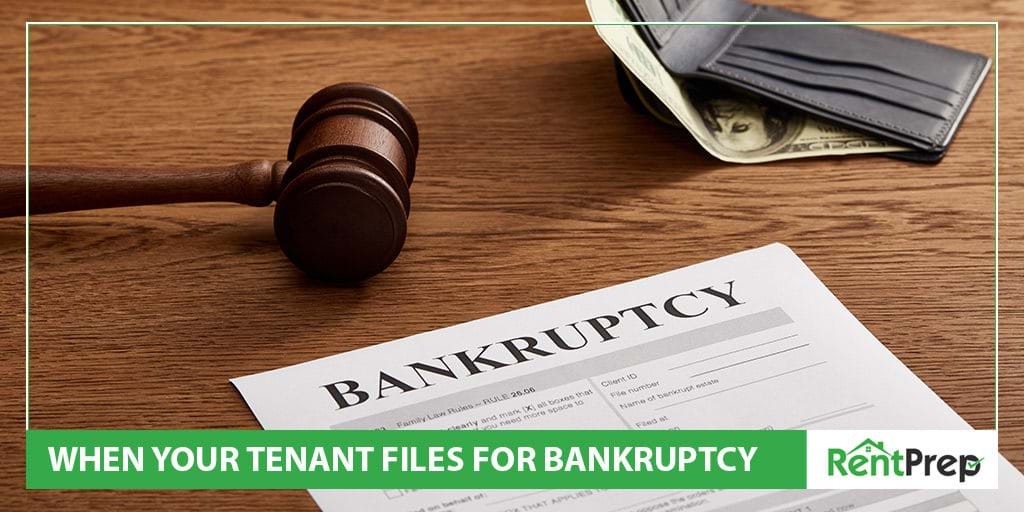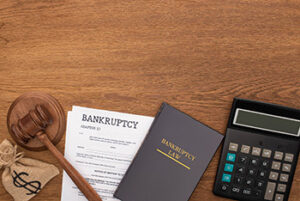
For many landlords, one of the scariest things that they can imagine is a tenant that doesn’t pay rent and eventually needs to be evicted. The time, money, and effort that goes into dealing with non-paying tenants and the entire eviction process is extreme, so landlords are right to be cautious of ending up in an eviction situation.
However, eviction is not the only scary word that landlords should be cautious of. Another word that might fly onto your radar if your tenants are not in good financial shape is bankruptcy. Tenants that file for bankruptcy are likely to leave you high and dry for a long time, if not forever.
What can landlords do when faced with a non-paying renter that files for bankruptcy? What types of action must they take, and how can they prevent themselves from ending up in this situation again?
To be the most successful landlord possible, you’ll want to learn all about the answers to those important bankruptcy questions and how to handle it. Thankfully, we’re here today with a complete guide about what to do when my tenant filed Chapter 7.
A Table Of Contents For When Residential Tenant Files Bankruptcy
- What Is Bankruptcy?
- My Tenant Filed Chapter 7; Now What?
- Landlord’s Plan Of Attack
- Preventing Future Bankruptcy Problems
What Is Bankruptcy?

Bankruptcy is a legal process that is used when someone cannot repay their debts and needs assistance in getting money back to their creditors. The process involves the liquidation of assets and other changes to the person’s financial and material wealth in order to reach some type of fair agreement with creditors.
As a landlord, it is likely the situations you might encounter with bankruptcy may be expected or more of a surprise. In some cases, a tenant may be paying rent on time to be able to stay in their home while their other debts become so large that they ultimately must file for bankruptcy.
There are a few specific types of bankruptcy that you should know more about to be able to appropriately handle what to do if your tenant files.
Types Of Bankruptcy
The two main types of bankruptcy that affect you as a landlord are the types that individuals most frequently file for: Chapter 7 and Chapter 13.
Chapter 7
Chapter 7 bankruptcy is a type of liquidation-based bankruptcy. The debtor in Chapter 7 must give all of their assets to a trustee, and the trustee then does the work of administering those assets in a way that satisfies creditors. If the tenant’s rent is current, they can continue their lease. If it is not, they will likely need to leave the property.
Sometimes, Chapter 7 bankruptcy is known as Straight Bankruptcy as it is the most direct type of bankruptcy. This type of plan is usually used for those that have a lot of debt to discharge that is unsecured, including medical bills, utility bills, credit card debt, and more.
Find out more information about what to do when you find a chapter 7 bankruptcy on a tenant screening report or your tenant files for chapter 7 bankruptcy here:
Chapter 13
Chapter 13 is a repayment plan-based bankruptcy. This can be seen as a type of reorganization of financial health rather than as a complete liquidation and fresh start. When a tenant filed Chapter 13, a person’s debts are reorganized into a payment plan that will have the debtor repay creditors over a period of three to five years.
Typically, this type of bankruptcy is used whenever short-term financial setbacks such as illness or job loss causes a person to take on unexpected debt.
My Tenant Filed Chapter 7; Now What?
Before you can understand what your reaction should be when you find out that your tenant filed for bankruptcy, you’ll need to understand what is going to happen to your tenant and their assets. Having an understanding of this will ensure that you can address all the appropriate areas correctly.
When a tenant files for bankruptcy, the court will grant what is known as an automatic stay. This means that all creditors will need to stop attempting to collect debts from the tenant until the case makes it through the court system.
Tenants that are renting will have to either assume or reject the lease that they are on. Typically, they will have up to 60 days to decide if they are going to assume or reject the lease. While you should still be receiving rent for that period of time, you will not be getting any back payments until a resolution is made.
Assuming Vs. Rejecting The Lease
When a tenant assumes the lease, this means that they will continue to stay on as a renter, and they will continue to pay rent. This can only be done if they are able to pay up on past-due rent quickly, and that they are able to give assurances that they will continue to pay rent promptly in the future.
While the court does not strictly define how quickly payments must be made, usually tenants in this type of debt will be required to pay it back within a year. They will also need to provide proof of income that shows they will be able to catch up on payments while also continuing to pay their rent in a timely manner.
If the tenant rejects the lease, the lease will become part of the assets that are liquidated or put onto a payment plan. This is a voluntary termination of the lease and will require the tenant to leave sooner rather than later. The tenant will no longer be bound by the terms of the lease.
Bankruptcy Court

Once the tenant’s assets have been properly cataloged and information about their debts has been gathered, a bankruptcy judge will decide whether or not the bankruptcy can continue as well as how the assets will be used to pay off the creditors in a fair way.
At the end of this judgment, you will be told how you can expect to be paid back for any back rent as well as what to expect from any rental time that the tenant has with you. The court ordered solution should be followed by all debtors and creditors, but it is possible to challenge the decision if you feel that it is not fair.
Move On
At times, it can feel like you’ll never be paid back for the rent that you are owed. And in some cases, you might not be!
While this can be a big blow to landlords, sometimes you simply have to take the hit and move forward. If the court orders the tenant to pay you back via a repayment plan, rest easy knowing that you will eventually get your money. Rather than sit around and think about the lost money forever, move on and make a fresh start with more reliable tenants in the future.
Landlord’s Plan Of Attack
Once your tenant has filed for bankruptcy, you need to be ready to set up your plan of attack. While you can be sympathetic to the unexpected problems that led your tenant into bankruptcy, you also need to protect the financial well-being of your business and be sure that their financial plan will include paying you back.
How do you go about ensuring that you’ll be included as the tenant’s assets are dispersed? Today, we’ll help you break down what things you should keep a close watch on as you work through this complex situation.
Check About The Automatic Stay
The automatic stay is one of the classic parts of the bankruptcy process that you might have to deal with. After a tenant files for bankruptcy, an automatic stay is placed that prevents creditors from collecting any debts or trying to collect any debts from a debtor until the bankruptcy case is ruled on.
This means that you as a landlord will no longer be able to try and collect any past-due rent. You also may not be able to file for eviction, though ongoing eviction cases that have already been ruled on can be continued. You can also continue to file for eviction if a tenant has done something illegal or otherwise endangered your property.
As soon as you find out that a tenant has filed for Chapter 13 or Chapter 7 bankruptcy, remember to stop trying to collect rent and move on to claim any debt in the proceedings.
Do I Still Get Paid?
While the automatic stay will pause any collection on past due rent, the tenant is legally required to continue paying rent for as long as their lease is active. They must continue to do so in a timely manner. The automatic stay does not change the fact that they owe you rent each month.
If the tenant does not continue with payments in a timely manner, you can ask the court to begin eviction proceedings as you would normally do regardless of the ongoing bankruptcy case. The court will decide how to handle things from there!
Claiming Any Debt
A claim is a statement that details the amount of money the debtor owes a creditor. In your case, your claim should outline how much money the tenant owes you and why. This document must be filed with the bankruptcy court if you want the debt owed to you to be part of the payment plan or liquidation fundraising.
You should always file a claim if a bankruptcy case is happening to ensure that you won’t lose any money, and this is especially important to do if the tenant rejects the lease.
If the tenant rejects the lease, you can claim some or all of the following:
- Past-due payments and related damages
- Unpaid rent or fees caused by the bankruptcy filing
- Damages caused by the lease rejection, up to one years’ rent
In time, you may also be able to make back any money that is spent on other chargers such as attorneys’ fees. To figure out when and how to get back as much of your money as possible, it is usually recommended to find a bankruptcy professional that can help you manage the paybacks.
What Else Can You Do
If you aren’t keen to wait through the bankruptcy process, it is possible that you could find some alternatives to consider as ways to solve your issue. While these solutions won’t always be possible, it is worth it to consider trying these as a way to save yourself time, money, and effort.
Pre-Bankruptcy Resolutions
Does it seem likely that a tenant of yours that is past-due on rent is going to ultimately need to file for bankruptcy? Have they told you that they will be filing for bankruptcy in the future? If so, you may want to try setting up a pre-bankruptcy resolution with the tenant before bankruptcy becomes an issue.
Consider the following:
- Could you make some lease changes so that the tenant can continue to rent from you and pay rent?
- Could you find a way to peacefully terminate the lease before the bankruptcy is filed?
- Is there a way to forgive some of their debt or have it repaid via early lease termination to alleviate stress on all sides?
Exploring these options is always a good idea. The terms set up in a pre-bankruptcy resolution are likely to be much more thorough and beneficial for both parties, so it’s worth asking if something like this would be possible or not.
Bankruptcy History
If you have any prior knowledge that the tenant is a serial bankruptcy filer, you may want to bring this to the judge’s attention. This should only be done if you have reason to believe that the bankruptcy was not done in good faith, and the tenant only filed to cause you more frustration in collecting any past-due rent or even getting them to move out.
Preventing Future Bankruptcy Problems
As you can see from today’s guide, going through the trial of one of your tenants filing for bankruptcy can be incredibly stressful and overwhelming. If we had it our way, we would avoid having to go through bankruptcy altogether!
While there is no sure-fire way to ensure that you will never need to deal with this type of situation, you can try to select tenants that are reliable and show a good financial history. Using factors like credit score will help you to make these selections.
Spending time choosing great tenants is always a key part of the rental process, and it is doubly important when you want to avoid any past-due rent or bankruptcy issues. Be careful in your tenant selection, and you could end up never having to use this guide in practice!
Stay Calm & Collected
Nobody wants to deal with the stress that accumulates whenever a residential tenant files for bankruptcy, but this situation doesn’t need to be one that ruins your business completely. In fact, there are very clear systems involved in a bankruptcy, so staying calm and organized is the most important thing to do.
Keep Things Organized:
- Try to set up a pre-bankruptcy resolution if possible.
- File your claim for any debts owed as soon as possible after filing.
- Wait patiently for the verdict, keeping a detailed record of any additional missed payments.
- Follow the court-ordered solution.
- Ask the right questions on your rental application to avoid future problems.
This process requires a good bit of effort, but you can recover from the stress and come out financially unburdened if you take things one step at a time!

